
|

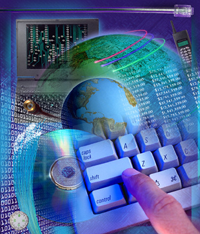 A final glance at the lens of power is important for nursing, to examine the dynamics of disciplinary and individual power in the context of utilizing information technology within nursing. A particular focus on the power that nurses exhibit in the context of using technologies within the health care system is important, as is a look at client power. The nursing literature is just beginning to provide a look at informatics through this particular lens which is actually a part of all of the previous perspectives addressed, from antithesis to networks. “As a society, we barely comprehend the true effects of our increasing involvement with computers. Technology does not function in a vacuum but within a social matrix, interacting with individuals in an organization. The use of computer capabilities can indeed affect the social and political dynamics in an organization by frequently rearranging communication patterns and the distribution of power” (Richards, 2001, p. 11).
A final glance at the lens of power is important for nursing, to examine the dynamics of disciplinary and individual power in the context of utilizing information technology within nursing. A particular focus on the power that nurses exhibit in the context of using technologies within the health care system is important, as is a look at client power. The nursing literature is just beginning to provide a look at informatics through this particular lens which is actually a part of all of the previous perspectives addressed, from antithesis to networks. “As a society, we barely comprehend the true effects of our increasing involvement with computers. Technology does not function in a vacuum but within a social matrix, interacting with individuals in an organization. The use of computer capabilities can indeed affect the social and political dynamics in an organization by frequently rearranging communication patterns and the distribution of power” (Richards, 2001, p. 11).
 Much of the contemporary nursing literature supports a noticeably strong modernist philosophy of nursing power, especially in relation to the integration of technologies into nursing practice. The maxim that “knowledge is power” and that the skillful use of computers and other ICTs is the heart of this power is a common thread through much of this literature (Ball, 2005; Canadian Nurses Association & Office of Health and the Information Highway, 2000; Richards, 2001; Buckeridge, 1999). “The computer literate nurse will have knowledge, and as a result, power and influence. Society has accepted computers as standard elements, and as such, computers will continue to shape nurses' psychological, social, economic, and political existence in innumerable ways. Nursing, in order to interface with other spheres of society, must be computer literate. In short, society has accepted computer technology as a means to enhance life; so must nursing” (Richards, 2001, p.9).
Much of the contemporary nursing literature supports a noticeably strong modernist philosophy of nursing power, especially in relation to the integration of technologies into nursing practice. The maxim that “knowledge is power” and that the skillful use of computers and other ICTs is the heart of this power is a common thread through much of this literature (Ball, 2005; Canadian Nurses Association & Office of Health and the Information Highway, 2000; Richards, 2001; Buckeridge, 1999). “The computer literate nurse will have knowledge, and as a result, power and influence. Society has accepted computers as standard elements, and as such, computers will continue to shape nurses' psychological, social, economic, and political existence in innumerable ways. Nursing, in order to interface with other spheres of society, must be computer literate. In short, society has accepted computer technology as a means to enhance life; so must nursing” (Richards, 2001, p.9).
Technologically Enhanced Disciplinary Power
 Nursing is a field that has striven to establish itself as a legitimate discipline in the eyes of other health profession groups and disciplines, and by society in general. Theory development and research have been the main activities embraced in this mission, coupled with the application and integration of technology into the nursing landscape. With the emergence of information technology, the inclusion of computers and eventually ICTs in nursing has become a way to boost prestige and influence within the health care system. “Our association with technological knowledge and skill has been a source of increased prestige and power for nursing” (Barnard & Sandelowski, 2001, p. 372). This lure of disciplinary power remains a common enticement to convince nurses that they should unquestioningly participate fully in the computerization of health care in all of its forms.
Nursing is a field that has striven to establish itself as a legitimate discipline in the eyes of other health profession groups and disciplines, and by society in general. Theory development and research have been the main activities embraced in this mission, coupled with the application and integration of technology into the nursing landscape. With the emergence of information technology, the inclusion of computers and eventually ICTs in nursing has become a way to boost prestige and influence within the health care system. “Our association with technological knowledge and skill has been a source of increased prestige and power for nursing” (Barnard & Sandelowski, 2001, p. 372). This lure of disciplinary power remains a common enticement to convince nurses that they should unquestioningly participate fully in the computerization of health care in all of its forms.
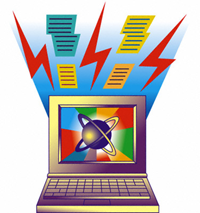 This enticement is not exclusive to nursing though, since nurses as a group are often also responsible for convincing clients that they too should embrace the wonders of technology in their own health care. “Transformed by our associations with the economics of healthcare delivery and the legalities of membership within professional associations, we are positioned to see and hear patients through prior written traces. Only in this way can 'continuity' of care be demonstrated. Our technologies of accountability demand this. The link between a disciplined gaze (what the nurse sees) and disciplined conduct (telling and showing what has been seen) establishes the conditions for legitimating nursing's knowledge as a discipline” (Purkis, 1999, p. 154).
This enticement is not exclusive to nursing though, since nurses as a group are often also responsible for convincing clients that they too should embrace the wonders of technology in their own health care. “Transformed by our associations with the economics of healthcare delivery and the legalities of membership within professional associations, we are positioned to see and hear patients through prior written traces. Only in this way can 'continuity' of care be demonstrated. Our technologies of accountability demand this. The link between a disciplined gaze (what the nurse sees) and disciplined conduct (telling and showing what has been seen) establishes the conditions for legitimating nursing's knowledge as a discipline” (Purkis, 1999, p. 154).
 Nursing informatics as a field, emerged from the overarching discipline of health informatics and alongside the expanding field of medical informatics. Nursing informatics researchers and theorists acknowledge these bonds with health and medical informatics but are also very careful to emphasize the importance and distinction of nursing informatics from all other similar fields. “Practitioners are interested in enrolling forms of technology that enable them to make visible their unique contribution to the care delivery enterprise. Latour's writings on 'technology' as durability offer methods for describing socio-technical processes that contribute to the appearance of domination. Challenging the prevailing view that order results from powerful domination, Latour argues that domination is an effect of contingent processes” (Purkis, 1999, p. 147).
Nursing informatics as a field, emerged from the overarching discipline of health informatics and alongside the expanding field of medical informatics. Nursing informatics researchers and theorists acknowledge these bonds with health and medical informatics but are also very careful to emphasize the importance and distinction of nursing informatics from all other similar fields. “Practitioners are interested in enrolling forms of technology that enable them to make visible their unique contribution to the care delivery enterprise. Latour's writings on 'technology' as durability offer methods for describing socio-technical processes that contribute to the appearance of domination. Challenging the prevailing view that order results from powerful domination, Latour argues that domination is an effect of contingent processes” (Purkis, 1999, p. 147).
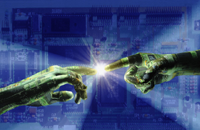 This tendency to focus on technology as a means for discipline articulation is not new. Sandelowski (2000) described how nurses have fashioned their care around similar technologies since the 1950s when physiological monitors became common within hospitals and clinics. “With the advent of machine monitoring in clinical nursing practice, nursing observation was transformed from a largely embodied relation with patients and devices to an increasingly hermeneutic relation with devices. Nursing became less corporeal and more hyperreal. Whereas nurses had once observed their patients in the world of the tool, they were now monitoring their patients in the world of the screen. Knowing patients increasingly meant keeping them under technological surveillance. This kind of knowing introduced a new kind of 'hands off' care, which contrasted sharply with traditional hands-on contact with the physical body” (Sandelowski, 2000, p. 155).
This tendency to focus on technology as a means for discipline articulation is not new. Sandelowski (2000) described how nurses have fashioned their care around similar technologies since the 1950s when physiological monitors became common within hospitals and clinics. “With the advent of machine monitoring in clinical nursing practice, nursing observation was transformed from a largely embodied relation with patients and devices to an increasingly hermeneutic relation with devices. Nursing became less corporeal and more hyperreal. Whereas nurses had once observed their patients in the world of the tool, they were now monitoring their patients in the world of the screen. Knowing patients increasingly meant keeping them under technological surveillance. This kind of knowing introduced a new kind of 'hands off' care, which contrasted sharply with traditional hands-on contact with the physical body” (Sandelowski, 2000, p. 155).
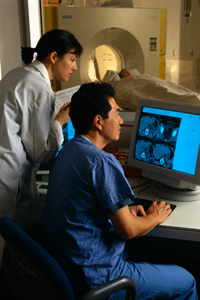 The world of the screen is fast becoming a constant reality within health care through the mediums of telenursing, e-health, hospital and nursing information systems, and advanced physiological monitoring. There is an alarming need for nurses to reflect and incubate ways to counteract the potential distancing and rupturing of relations with clients that can accompany the use of information technologies in nursing care. “It is argued that in health care systems where the mismatch between treatment options and resources for care steadily grows, the nursing discipline must develop ecological literacy for a technological world” (Marck, 2000, p. 62). Nurses need to ponder on how these inevitable technologies can be included in nursing care in ways that actually allow more embodied time and presence with clients. The promise has been given over and over in the literature – that the use of computerized information systems will free both time and energy so that nurses can perform their in-person nursing care in a more present, more reciprocal and attentive way: to be with the client. Yet, that promise has not been realized, nor will it be as long as a modernist drive for doing more with less remains a reality in health care.
The world of the screen is fast becoming a constant reality within health care through the mediums of telenursing, e-health, hospital and nursing information systems, and advanced physiological monitoring. There is an alarming need for nurses to reflect and incubate ways to counteract the potential distancing and rupturing of relations with clients that can accompany the use of information technologies in nursing care. “It is argued that in health care systems where the mismatch between treatment options and resources for care steadily grows, the nursing discipline must develop ecological literacy for a technological world” (Marck, 2000, p. 62). Nurses need to ponder on how these inevitable technologies can be included in nursing care in ways that actually allow more embodied time and presence with clients. The promise has been given over and over in the literature – that the use of computerized information systems will free both time and energy so that nurses can perform their in-person nursing care in a more present, more reciprocal and attentive way: to be with the client. Yet, that promise has not been realized, nor will it be as long as a modernist drive for doing more with less remains a reality in health care.
Discovery of Hidden Governmentality
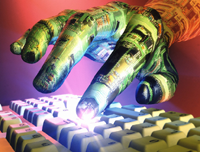 As previously mentioned, primary health care has been recognized as the best possible model for fashioning the present and future Canadian health care system. Self-care and health promotion are both critical and contingent to the success of this movement. One of the primary roles of nurses is that of health educator, devoted to guiding clients in how to take their health into their own hands, by following regimes of healthy living. “Registered nurses will become information brokers and educators to support consumers using ICTs” (Canadian Nurses Association & Office of Health and the Information Highway, 2000, p.12). This trend can be seen through a positive lens, since people do enjoy much more dynamic lives when their bodies are well nourished, fit, and free from disease. But it can also be looked at through the lens of power as a form of surveillance, perpetuated to control and normalize the health of clients. “Surveillance in these contexts is an intervention of social control, as opposed to benign clinical assessment. According to Foucault, surveillance disciplines, such as the criminal justice system and medicine, acquire and maintain power by virtue of their authority to look. According to Foucault, contemporary measures of power are ensured not by right, or law, or punishment, but rather by, normalization, control and technique” (Sandelowski, 2000, p. 157).
As previously mentioned, primary health care has been recognized as the best possible model for fashioning the present and future Canadian health care system. Self-care and health promotion are both critical and contingent to the success of this movement. One of the primary roles of nurses is that of health educator, devoted to guiding clients in how to take their health into their own hands, by following regimes of healthy living. “Registered nurses will become information brokers and educators to support consumers using ICTs” (Canadian Nurses Association & Office of Health and the Information Highway, 2000, p.12). This trend can be seen through a positive lens, since people do enjoy much more dynamic lives when their bodies are well nourished, fit, and free from disease. But it can also be looked at through the lens of power as a form of surveillance, perpetuated to control and normalize the health of clients. “Surveillance in these contexts is an intervention of social control, as opposed to benign clinical assessment. According to Foucault, surveillance disciplines, such as the criminal justice system and medicine, acquire and maintain power by virtue of their authority to look. According to Foucault, contemporary measures of power are ensured not by right, or law, or punishment, but rather by, normalization, control and technique” (Sandelowski, 2000, p. 157).
 The growing arena of E-health is grounded in this movement of health promotion and self-care, supported by a large array of Internet based resources and bodies of information. Nurses are responsible for ensuring that ethical information and choice are included in the E-health context, and any other situation where information technology is a part of nursing care. The “Internet eHealth Code of Ethics (by Internet Healthcare Coalition and the ehealth faEthics Summit) – meant to be international, inclusive, and comprehensive with the goal to ensure that all people worldwide can confidently, without risk, realize the full benefits of the Internet to improve their health. [The code is] founded on eight principles: candor, honesty, quality, informed consent, privacy, professionalism, responsible partnering, and accountability” (Kaplan & Flatley Brennan, 2001, p. 311). If people are going to embrace self-care and seek out information for themselves, nurses must be there to support their choices, not just provide rote health information based on diagnoses and generalizations. Kaplan and Flatley Brennan (2001) identified three areas that nurses could focus on to support client choice and individualized care - a) determining what constitutes a “patient's view” of information; b) deliver targeted, personalized, just in time information and c) assess what affective messages are carried by the technology, either explicitly or implicitly, [how they] situate care in the context of a patient's life (p. 313).
The growing arena of E-health is grounded in this movement of health promotion and self-care, supported by a large array of Internet based resources and bodies of information. Nurses are responsible for ensuring that ethical information and choice are included in the E-health context, and any other situation where information technology is a part of nursing care. The “Internet eHealth Code of Ethics (by Internet Healthcare Coalition and the ehealth faEthics Summit) – meant to be international, inclusive, and comprehensive with the goal to ensure that all people worldwide can confidently, without risk, realize the full benefits of the Internet to improve their health. [The code is] founded on eight principles: candor, honesty, quality, informed consent, privacy, professionalism, responsible partnering, and accountability” (Kaplan & Flatley Brennan, 2001, p. 311). If people are going to embrace self-care and seek out information for themselves, nurses must be there to support their choices, not just provide rote health information based on diagnoses and generalizations. Kaplan and Flatley Brennan (2001) identified three areas that nurses could focus on to support client choice and individualized care - a) determining what constitutes a “patient's view” of information; b) deliver targeted, personalized, just in time information and c) assess what affective messages are carried by the technology, either explicitly or implicitly, [how they] situate care in the context of a patient's life (p. 313).
 National electronic health records (EHRs) are another technological development that has received enormous support, funding, and time investment across the globe. Electronic medical records software is helping to reduce operating costs and keep patient records more organized. “The arrival of near-ubiquitous electronic networks has finally made it practical to realise the goal of true person-centric information technology systems. The holy grail of health informatics, a true lifelong electronic health record, is becoming a reality” (Harrison & Booth, 2003, p. 223). Various groups including the Canadian Nurses Association continue to work on developing the nursing data classifications to be included in the projected national Electronic Health Record.
National electronic health records (EHRs) are another technological development that has received enormous support, funding, and time investment across the globe. Electronic medical records software is helping to reduce operating costs and keep patient records more organized. “The arrival of near-ubiquitous electronic networks has finally made it practical to realise the goal of true person-centric information technology systems. The holy grail of health informatics, a true lifelong electronic health record, is becoming a reality” (Harrison & Booth, 2003, p. 223). Various groups including the Canadian Nurses Association continue to work on developing the nursing data classifications to be included in the projected national Electronic Health Record.
 The EHR is lauded as the perfect way to ensure continuity of care since every health care system encounter can be digitally recorded and added to the record. In one database file, a person's entire medical and health history can be accessed and inspected by authorized health professionals across the nation, and even internationally in some instances. “An ICT-supported health care system will seamlessly link all points of care for the consumer, often across geographic borders. Homes, health care providers, community clinics, long term care facilities, acute care hospitals, telehealth service providers, etc. will all be linked electronically. With permission, providers at all points of care will be able to access a consumer's EHR” (Canadian Nurses Association & Office of Health and the Information Highway, 2000, p.11). The ideal context for this new development in health informatics is that the person, the client, will have control of their own EHR. “Recent work in the emerging field of network or digital identity suggests a new approach to the design of informatics systems, in which the individual becomes the guardian of their own personal data, and is assisted in controlling access to it by an infrastructure that is aware of roles, such as 'doctor' and relationships such as 'doctor-patient” (Harrison & Booth, 2003, p. 223).
The EHR is lauded as the perfect way to ensure continuity of care since every health care system encounter can be digitally recorded and added to the record. In one database file, a person's entire medical and health history can be accessed and inspected by authorized health professionals across the nation, and even internationally in some instances. “An ICT-supported health care system will seamlessly link all points of care for the consumer, often across geographic borders. Homes, health care providers, community clinics, long term care facilities, acute care hospitals, telehealth service providers, etc. will all be linked electronically. With permission, providers at all points of care will be able to access a consumer's EHR” (Canadian Nurses Association & Office of Health and the Information Highway, 2000, p.11). The ideal context for this new development in health informatics is that the person, the client, will have control of their own EHR. “Recent work in the emerging field of network or digital identity suggests a new approach to the design of informatics systems, in which the individual becomes the guardian of their own personal data, and is assisted in controlling access to it by an infrastructure that is aware of roles, such as 'doctor' and relationships such as 'doctor-patient” (Harrison & Booth, 2003, p. 223).
 The literature insists that EHRs are a positive development that will put the client in control of their own health information, which supposedly will give them more access and control. “Consumer involvement: secure personal health records, maintained by the patient and his or her physician, insurer, or others, give the patient unrecedented access and control. This not only means a better-informed consumer, but also directs consumer involvement regarding care decisions”(Moody, 2005, p. 158).
The literature insists that EHRs are a positive development that will put the client in control of their own health information, which supposedly will give them more access and control. “Consumer involvement: secure personal health records, maintained by the patient and his or her physician, insurer, or others, give the patient unrecedented access and control. This not only means a better-informed consumer, but also directs consumer involvement regarding care decisions”(Moody, 2005, p. 158).  Considering how difficult it is for people to keep organized health records through out their life time, this new way to formally witness a person's life health does seem like a positive endeavor. However, it too could act as a very serious artifact of surveillance. “The challenge here is that prevailing understanding of who pushes who around (and with what) in an effort to control and organize, must be re-examined” (Purkis, 1999, p. 149). Nurses must always be aware that “Technology is not neutral. It has effects. And these effects are, for Latour, transformational such that the removal of a non-human actor will not 'solve' the problem” (Purkis, 1999, p. 149). A permanent record of a person's health history could become a dangerous artifact, especially if there are entries that reflect habits, behaviours or diseases that are considered socially derogatory or unacceptable. In an extreme view, this pool of personal information could be a sentence to social ostracization, exclusion, denial of privileges, and other forms of oppression or punishment. Nurses must be part of the dialogue, planning, and shaping of these emerging EHR and adopt the role of client advocate to protect personal information, rights, and choice.
Considering how difficult it is for people to keep organized health records through out their life time, this new way to formally witness a person's life health does seem like a positive endeavor. However, it too could act as a very serious artifact of surveillance. “The challenge here is that prevailing understanding of who pushes who around (and with what) in an effort to control and organize, must be re-examined” (Purkis, 1999, p. 149). Nurses must always be aware that “Technology is not neutral. It has effects. And these effects are, for Latour, transformational such that the removal of a non-human actor will not 'solve' the problem” (Purkis, 1999, p. 149). A permanent record of a person's health history could become a dangerous artifact, especially if there are entries that reflect habits, behaviours or diseases that are considered socially derogatory or unacceptable. In an extreme view, this pool of personal information could be a sentence to social ostracization, exclusion, denial of privileges, and other forms of oppression or punishment. Nurses must be part of the dialogue, planning, and shaping of these emerging EHR and adopt the role of client advocate to protect personal information, rights, and choice.
 Beyond participation in the planning and decision-making in informatics initiatives, nurses can help the public best by becoming as technologically astute as possible. This expertise and awareness needs to be coupled with a critical social lens to view both the benefits and dangers of nursing through technological means. Once nurses become comfortable with various technologies, they can shape them, refine them, and apply them in new and different ways – just as they have always adapted earlier equipment and technologies.
Beyond participation in the planning and decision-making in informatics initiatives, nurses can help the public best by becoming as technologically astute as possible. This expertise and awareness needs to be coupled with a critical social lens to view both the benefits and dangers of nursing through technological means. Once nurses become comfortable with various technologies, they can shape them, refine them, and apply them in new and different ways – just as they have always adapted earlier equipment and technologies.
 It is predicted that as today's young people enter nursing and become the norm in practice that they will also bring insights and abilities that will help to reinforce client-centered care coupled with a natural affinity with technologies. “Digital media is increasingly a reflection of our worldview, disciplines, commercial interest, and knowledge repository. Because this form of media is interactive and malleable, it is a vehicle for unprecedented change throughout our social attitudes and structure. A massive communications revolution (paradigm shift) is under way, one that will have profound effects upon the art and science of nursing. Currently, nurses, as a group are unsophisticated in informatics potential. This lack of computer skill in a majority of practicing nurses will be a major drawback in meeting the high technology challenges of our present professional domain. Such a deficiency is juxtaposed against the fact that young nurses entering the profession have grown up surrounded by technology, assimilating it as easily as the air they breathe. These new graduates will bring with them new, powerful tools for inquiry, analysis and self expression. They will begin to question the implicit values contained in information we have historically championed and cherished within our profession. It is through the use of digital media that our forthcoming nurses will cultivate and superimpose their culture on society” (Richards, 2001, p.6). This prediction holds promise, but nursing can not just wait for inevitable replacement by more technologically savvy young nurses. Nurses need to gain the insight to look at all of the different lens and perspectives discussed to view the realities of applying information technology to nursing, and apply critical awareness and interventional strategies to how they shape client care.
It is predicted that as today's young people enter nursing and become the norm in practice that they will also bring insights and abilities that will help to reinforce client-centered care coupled with a natural affinity with technologies. “Digital media is increasingly a reflection of our worldview, disciplines, commercial interest, and knowledge repository. Because this form of media is interactive and malleable, it is a vehicle for unprecedented change throughout our social attitudes and structure. A massive communications revolution (paradigm shift) is under way, one that will have profound effects upon the art and science of nursing. Currently, nurses, as a group are unsophisticated in informatics potential. This lack of computer skill in a majority of practicing nurses will be a major drawback in meeting the high technology challenges of our present professional domain. Such a deficiency is juxtaposed against the fact that young nurses entering the profession have grown up surrounded by technology, assimilating it as easily as the air they breathe. These new graduates will bring with them new, powerful tools for inquiry, analysis and self expression. They will begin to question the implicit values contained in information we have historically championed and cherished within our profession. It is through the use of digital media that our forthcoming nurses will cultivate and superimpose their culture on society” (Richards, 2001, p.6). This prediction holds promise, but nursing can not just wait for inevitable replacement by more technologically savvy young nurses. Nurses need to gain the insight to look at all of the different lens and perspectives discussed to view the realities of applying information technology to nursing, and apply critical awareness and interventional strategies to how they shape client care.
|
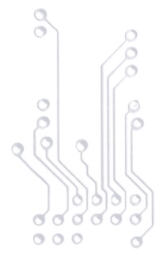
|




 A final glance at the lens of power is important for nursing, to examine the dynamics of disciplinary and individual power in the context of utilizing information technology within nursing. A particular focus on the power that nurses exhibit in the context of using technologies within the health care system is important, as is a look at client power. The nursing literature is just beginning to provide a look at informatics through this particular lens which is actually a part of all of the previous perspectives addressed, from antithesis to networks. “As a society, we barely comprehend the true effects of our increasing involvement with computers. Technology does not function in a vacuum but within a social matrix, interacting with individuals in an organization. The use of computer capabilities can indeed affect the social and political dynamics in an organization by frequently rearranging communication patterns and the distribution of power” (Richards, 2001, p. 11).
A final glance at the lens of power is important for nursing, to examine the dynamics of disciplinary and individual power in the context of utilizing information technology within nursing. A particular focus on the power that nurses exhibit in the context of using technologies within the health care system is important, as is a look at client power. The nursing literature is just beginning to provide a look at informatics through this particular lens which is actually a part of all of the previous perspectives addressed, from antithesis to networks. “As a society, we barely comprehend the true effects of our increasing involvement with computers. Technology does not function in a vacuum but within a social matrix, interacting with individuals in an organization. The use of computer capabilities can indeed affect the social and political dynamics in an organization by frequently rearranging communication patterns and the distribution of power” (Richards, 2001, p. 11). Much of the contemporary nursing literature supports a noticeably strong modernist philosophy of nursing power, especially in relation to the integration of technologies into nursing practice. The maxim that “knowledge is power” and that the skillful use of computers and other ICTs is the heart of this power is a common thread through much of this literature (Ball, 2005; Canadian Nurses Association & Office of Health and the Information Highway, 2000; Richards, 2001; Buckeridge, 1999). “The computer literate nurse will have knowledge, and as a result, power and influence. Society has accepted computers as standard elements, and as such, computers will continue to shape nurses' psychological, social, economic, and political existence in innumerable ways. Nursing, in order to interface with other spheres of society, must be computer literate. In short, society has accepted computer technology as a means to enhance life; so must nursing” (Richards, 2001, p.9).
Much of the contemporary nursing literature supports a noticeably strong modernist philosophy of nursing power, especially in relation to the integration of technologies into nursing practice. The maxim that “knowledge is power” and that the skillful use of computers and other ICTs is the heart of this power is a common thread through much of this literature (Ball, 2005; Canadian Nurses Association & Office of Health and the Information Highway, 2000; Richards, 2001; Buckeridge, 1999). “The computer literate nurse will have knowledge, and as a result, power and influence. Society has accepted computers as standard elements, and as such, computers will continue to shape nurses' psychological, social, economic, and political existence in innumerable ways. Nursing, in order to interface with other spheres of society, must be computer literate. In short, society has accepted computer technology as a means to enhance life; so must nursing” (Richards, 2001, p.9).
 Nursing is a field that has striven to establish itself as a legitimate discipline in the eyes of other health profession groups and disciplines, and by society in general. Theory development and research have been the main activities embraced in this mission, coupled with the application and integration of technology into the nursing landscape. With the emergence of information technology, the inclusion of computers and eventually ICTs in nursing has become a way to boost prestige and influence within the health care system. “Our association with technological knowledge and skill has been a source of increased prestige and power for nursing” (Barnard & Sandelowski, 2001, p. 372). This lure of disciplinary power remains a common enticement to convince nurses that they should unquestioningly participate fully in the computerization of health care in all of its forms.
Nursing is a field that has striven to establish itself as a legitimate discipline in the eyes of other health profession groups and disciplines, and by society in general. Theory development and research have been the main activities embraced in this mission, coupled with the application and integration of technology into the nursing landscape. With the emergence of information technology, the inclusion of computers and eventually ICTs in nursing has become a way to boost prestige and influence within the health care system. “Our association with technological knowledge and skill has been a source of increased prestige and power for nursing” (Barnard & Sandelowski, 2001, p. 372). This lure of disciplinary power remains a common enticement to convince nurses that they should unquestioningly participate fully in the computerization of health care in all of its forms.  This enticement is not exclusive to nursing though, since nurses as a group are often also responsible for convincing clients that they too should embrace the wonders of technology in their own health care. “Transformed by our associations with the economics of healthcare delivery and the legalities of membership within professional associations, we are positioned to see and hear patients through prior written traces. Only in this way can 'continuity' of care be demonstrated. Our technologies of accountability demand this. The link between a disciplined gaze (what the nurse sees) and disciplined conduct (telling and showing what has been seen) establishes the conditions for legitimating nursing's knowledge as a discipline” (Purkis, 1999, p. 154).
This enticement is not exclusive to nursing though, since nurses as a group are often also responsible for convincing clients that they too should embrace the wonders of technology in their own health care. “Transformed by our associations with the economics of healthcare delivery and the legalities of membership within professional associations, we are positioned to see and hear patients through prior written traces. Only in this way can 'continuity' of care be demonstrated. Our technologies of accountability demand this. The link between a disciplined gaze (what the nurse sees) and disciplined conduct (telling and showing what has been seen) establishes the conditions for legitimating nursing's knowledge as a discipline” (Purkis, 1999, p. 154).  Nursing informatics as a field, emerged from the overarching discipline of health informatics and alongside the expanding field of medical informatics. Nursing informatics researchers and theorists acknowledge these bonds with health and medical informatics but are also very careful to emphasize the importance and distinction of nursing informatics from all other similar fields. “Practitioners are interested in enrolling forms of technology that enable them to make visible their unique contribution to the care delivery enterprise. Latour's writings on 'technology' as durability offer methods for describing socio-technical processes that contribute to the appearance of domination. Challenging the prevailing view that order results from powerful domination, Latour argues that domination is an effect of contingent processes” (Purkis, 1999, p. 147).
Nursing informatics as a field, emerged from the overarching discipline of health informatics and alongside the expanding field of medical informatics. Nursing informatics researchers and theorists acknowledge these bonds with health and medical informatics but are also very careful to emphasize the importance and distinction of nursing informatics from all other similar fields. “Practitioners are interested in enrolling forms of technology that enable them to make visible their unique contribution to the care delivery enterprise. Latour's writings on 'technology' as durability offer methods for describing socio-technical processes that contribute to the appearance of domination. Challenging the prevailing view that order results from powerful domination, Latour argues that domination is an effect of contingent processes” (Purkis, 1999, p. 147).  This tendency to focus on technology as a means for discipline articulation is not new. Sandelowski (2000) described how nurses have fashioned their care around similar technologies since the 1950s when physiological monitors became common within hospitals and clinics. “With the advent of machine monitoring in clinical nursing practice, nursing observation was transformed from a largely embodied relation with patients and devices to an increasingly hermeneutic relation with devices. Nursing became less corporeal and more hyperreal. Whereas nurses had once observed their patients in the world of the tool, they were now monitoring their patients in the world of the screen. Knowing patients increasingly meant keeping them under technological surveillance. This kind of knowing introduced a new kind of 'hands off' care, which contrasted sharply with traditional hands-on contact with the physical body” (Sandelowski, 2000, p. 155).
This tendency to focus on technology as a means for discipline articulation is not new. Sandelowski (2000) described how nurses have fashioned their care around similar technologies since the 1950s when physiological monitors became common within hospitals and clinics. “With the advent of machine monitoring in clinical nursing practice, nursing observation was transformed from a largely embodied relation with patients and devices to an increasingly hermeneutic relation with devices. Nursing became less corporeal and more hyperreal. Whereas nurses had once observed their patients in the world of the tool, they were now monitoring their patients in the world of the screen. Knowing patients increasingly meant keeping them under technological surveillance. This kind of knowing introduced a new kind of 'hands off' care, which contrasted sharply with traditional hands-on contact with the physical body” (Sandelowski, 2000, p. 155).  The world of the screen is fast becoming a constant reality within health care through the mediums of telenursing, e-health, hospital and nursing information systems, and advanced physiological monitoring. There is an alarming need for nurses to reflect and incubate ways to counteract the potential distancing and rupturing of relations with clients that can accompany the use of information technologies in nursing care. “It is argued that in health care systems where the mismatch between treatment options and resources for care steadily grows, the nursing discipline must develop ecological literacy for a technological world” (Marck, 2000, p. 62). Nurses need to ponder on how these inevitable technologies can be included in nursing care in ways that actually allow more embodied time and presence with clients. The promise has been given over and over in the literature – that the use of computerized information systems will free both time and energy so that nurses can perform their in-person nursing care in a more present, more reciprocal and attentive way: to be with the client. Yet, that promise has not been realized, nor will it be as long as a modernist drive for doing more with less remains a reality in health care.
The world of the screen is fast becoming a constant reality within health care through the mediums of telenursing, e-health, hospital and nursing information systems, and advanced physiological monitoring. There is an alarming need for nurses to reflect and incubate ways to counteract the potential distancing and rupturing of relations with clients that can accompany the use of information technologies in nursing care. “It is argued that in health care systems where the mismatch between treatment options and resources for care steadily grows, the nursing discipline must develop ecological literacy for a technological world” (Marck, 2000, p. 62). Nurses need to ponder on how these inevitable technologies can be included in nursing care in ways that actually allow more embodied time and presence with clients. The promise has been given over and over in the literature – that the use of computerized information systems will free both time and energy so that nurses can perform their in-person nursing care in a more present, more reciprocal and attentive way: to be with the client. Yet, that promise has not been realized, nor will it be as long as a modernist drive for doing more with less remains a reality in health care.
 As previously mentioned, primary health care has been recognized as the best possible model for fashioning the present and future Canadian health care system. Self-care and health promotion are both critical and contingent to the success of this movement. One of the primary roles of nurses is that of health educator, devoted to guiding clients in how to take their health into their own hands, by following regimes of healthy living. “Registered nurses will become information brokers and educators to support consumers using ICTs” (Canadian Nurses Association & Office of Health and the Information Highway, 2000, p.12). This trend can be seen through a positive lens, since people do enjoy much more dynamic lives when their bodies are well nourished, fit, and free from disease. But it can also be looked at through the lens of power as a form of surveillance, perpetuated to control and normalize the health of clients. “Surveillance in these contexts is an intervention of social control, as opposed to benign clinical assessment. According to Foucault, surveillance disciplines, such as the criminal justice system and medicine, acquire and maintain power by virtue of their authority to look. According to Foucault, contemporary measures of power are ensured not by right, or law, or punishment, but rather by, normalization, control and technique” (Sandelowski, 2000, p. 157).
As previously mentioned, primary health care has been recognized as the best possible model for fashioning the present and future Canadian health care system. Self-care and health promotion are both critical and contingent to the success of this movement. One of the primary roles of nurses is that of health educator, devoted to guiding clients in how to take their health into their own hands, by following regimes of healthy living. “Registered nurses will become information brokers and educators to support consumers using ICTs” (Canadian Nurses Association & Office of Health and the Information Highway, 2000, p.12). This trend can be seen through a positive lens, since people do enjoy much more dynamic lives when their bodies are well nourished, fit, and free from disease. But it can also be looked at through the lens of power as a form of surveillance, perpetuated to control and normalize the health of clients. “Surveillance in these contexts is an intervention of social control, as opposed to benign clinical assessment. According to Foucault, surveillance disciplines, such as the criminal justice system and medicine, acquire and maintain power by virtue of their authority to look. According to Foucault, contemporary measures of power are ensured not by right, or law, or punishment, but rather by, normalization, control and technique” (Sandelowski, 2000, p. 157).  The growing arena of E-health is grounded in this movement of health promotion and self-care, supported by a large array of Internet based resources and bodies of information. Nurses are responsible for ensuring that ethical information and choice are included in the E-health context, and any other situation where information technology is a part of nursing care. The “Internet eHealth Code of Ethics (by Internet Healthcare Coalition and the ehealth faEthics Summit) – meant to be international, inclusive, and comprehensive with the goal to ensure that all people worldwide can confidently, without risk, realize the full benefits of the Internet to improve their health. [The code is] founded on eight principles: candor, honesty, quality, informed consent, privacy, professionalism, responsible partnering, and accountability” (Kaplan & Flatley Brennan, 2001, p. 311). If people are going to embrace self-care and seek out information for themselves, nurses must be there to support their choices, not just provide rote health information based on diagnoses and generalizations. Kaplan and Flatley Brennan (2001) identified three areas that nurses could focus on to support client choice and individualized care - a) determining what constitutes a “patient's view” of information; b) deliver targeted, personalized, just in time information and c) assess what affective messages are carried by the technology, either explicitly or implicitly, [how they] situate care in the context of a patient's life (p. 313).
The growing arena of E-health is grounded in this movement of health promotion and self-care, supported by a large array of Internet based resources and bodies of information. Nurses are responsible for ensuring that ethical information and choice are included in the E-health context, and any other situation where information technology is a part of nursing care. The “Internet eHealth Code of Ethics (by Internet Healthcare Coalition and the ehealth faEthics Summit) – meant to be international, inclusive, and comprehensive with the goal to ensure that all people worldwide can confidently, without risk, realize the full benefits of the Internet to improve their health. [The code is] founded on eight principles: candor, honesty, quality, informed consent, privacy, professionalism, responsible partnering, and accountability” (Kaplan & Flatley Brennan, 2001, p. 311). If people are going to embrace self-care and seek out information for themselves, nurses must be there to support their choices, not just provide rote health information based on diagnoses and generalizations. Kaplan and Flatley Brennan (2001) identified three areas that nurses could focus on to support client choice and individualized care - a) determining what constitutes a “patient's view” of information; b) deliver targeted, personalized, just in time information and c) assess what affective messages are carried by the technology, either explicitly or implicitly, [how they] situate care in the context of a patient's life (p. 313).  National electronic health records (EHRs) are another technological development that has received enormous support, funding, and time investment across the globe. Electronic medical records software is helping to reduce operating costs and keep patient records more organized. “The arrival of near-ubiquitous electronic networks has finally made it practical to realise the goal of true person-centric information technology systems. The holy grail of health informatics, a true lifelong electronic health record, is becoming a reality” (Harrison & Booth, 2003, p. 223). Various groups including the Canadian Nurses Association continue to work on developing the nursing data classifications to be included in the projected national Electronic Health Record.
National electronic health records (EHRs) are another technological development that has received enormous support, funding, and time investment across the globe. Electronic medical records software is helping to reduce operating costs and keep patient records more organized. “The arrival of near-ubiquitous electronic networks has finally made it practical to realise the goal of true person-centric information technology systems. The holy grail of health informatics, a true lifelong electronic health record, is becoming a reality” (Harrison & Booth, 2003, p. 223). Various groups including the Canadian Nurses Association continue to work on developing the nursing data classifications to be included in the projected national Electronic Health Record. The EHR is lauded as the perfect way to ensure continuity of care since every health care system encounter can be digitally recorded and added to the record. In one database file, a person's entire medical and health history can be accessed and inspected by authorized health professionals across the nation, and even internationally in some instances. “An ICT-supported health care system will seamlessly link all points of care for the consumer, often across geographic borders. Homes, health care providers, community clinics, long term care facilities, acute care hospitals, telehealth service providers, etc. will all be linked electronically. With permission, providers at all points of care will be able to access a consumer's EHR” (Canadian Nurses Association & Office of Health and the Information Highway, 2000, p.11). The ideal context for this new development in health informatics is that the person, the client, will have control of their own EHR. “Recent work in the emerging field of network or digital identity suggests a new approach to the design of informatics systems, in which the individual becomes the guardian of their own personal data, and is assisted in controlling access to it by an infrastructure that is aware of roles, such as 'doctor' and relationships such as 'doctor-patient” (Harrison & Booth, 2003, p. 223).
The EHR is lauded as the perfect way to ensure continuity of care since every health care system encounter can be digitally recorded and added to the record. In one database file, a person's entire medical and health history can be accessed and inspected by authorized health professionals across the nation, and even internationally in some instances. “An ICT-supported health care system will seamlessly link all points of care for the consumer, often across geographic borders. Homes, health care providers, community clinics, long term care facilities, acute care hospitals, telehealth service providers, etc. will all be linked electronically. With permission, providers at all points of care will be able to access a consumer's EHR” (Canadian Nurses Association & Office of Health and the Information Highway, 2000, p.11). The ideal context for this new development in health informatics is that the person, the client, will have control of their own EHR. “Recent work in the emerging field of network or digital identity suggests a new approach to the design of informatics systems, in which the individual becomes the guardian of their own personal data, and is assisted in controlling access to it by an infrastructure that is aware of roles, such as 'doctor' and relationships such as 'doctor-patient” (Harrison & Booth, 2003, p. 223).  The literature insists that EHRs are a positive development that will put the client in control of their own health information, which supposedly will give them more access and control. “Consumer involvement: secure personal health records, maintained by the patient and his or her physician, insurer, or others, give the patient unrecedented access and control. This not only means a better-informed consumer, but also directs consumer involvement regarding care decisions”(Moody, 2005, p. 158).
The literature insists that EHRs are a positive development that will put the client in control of their own health information, which supposedly will give them more access and control. “Consumer involvement: secure personal health records, maintained by the patient and his or her physician, insurer, or others, give the patient unrecedented access and control. This not only means a better-informed consumer, but also directs consumer involvement regarding care decisions”(Moody, 2005, p. 158).  Considering how difficult it is for people to keep organized health records through out their life time, this new way to formally witness a person's life health does seem like a positive endeavor. However, it too could act as a very serious artifact of surveillance. “The challenge here is that prevailing understanding of who pushes who around (and with what) in an effort to control and organize, must be re-examined” (Purkis, 1999, p. 149). Nurses must always be aware that “Technology is not neutral. It has effects. And these effects are, for Latour, transformational such that the removal of a non-human actor will not 'solve' the problem” (Purkis, 1999, p. 149). A permanent record of a person's health history could become a dangerous artifact, especially if there are entries that reflect habits, behaviours or diseases that are considered socially derogatory or unacceptable. In an extreme view, this pool of personal information could be a sentence to social ostracization, exclusion, denial of privileges, and other forms of oppression or punishment. Nurses must be part of the dialogue, planning, and shaping of these emerging EHR and adopt the role of client advocate to protect personal information, rights, and choice.
Considering how difficult it is for people to keep organized health records through out their life time, this new way to formally witness a person's life health does seem like a positive endeavor. However, it too could act as a very serious artifact of surveillance. “The challenge here is that prevailing understanding of who pushes who around (and with what) in an effort to control and organize, must be re-examined” (Purkis, 1999, p. 149). Nurses must always be aware that “Technology is not neutral. It has effects. And these effects are, for Latour, transformational such that the removal of a non-human actor will not 'solve' the problem” (Purkis, 1999, p. 149). A permanent record of a person's health history could become a dangerous artifact, especially if there are entries that reflect habits, behaviours or diseases that are considered socially derogatory or unacceptable. In an extreme view, this pool of personal information could be a sentence to social ostracization, exclusion, denial of privileges, and other forms of oppression or punishment. Nurses must be part of the dialogue, planning, and shaping of these emerging EHR and adopt the role of client advocate to protect personal information, rights, and choice.  Beyond participation in the planning and decision-making in informatics initiatives, nurses can help the public best by becoming as technologically astute as possible. This expertise and awareness needs to be coupled with a critical social lens to view both the benefits and dangers of nursing through technological means. Once nurses become comfortable with various technologies, they can shape them, refine them, and apply them in new and different ways – just as they have always adapted earlier equipment and technologies.
Beyond participation in the planning and decision-making in informatics initiatives, nurses can help the public best by becoming as technologically astute as possible. This expertise and awareness needs to be coupled with a critical social lens to view both the benefits and dangers of nursing through technological means. Once nurses become comfortable with various technologies, they can shape them, refine them, and apply them in new and different ways – just as they have always adapted earlier equipment and technologies. It is predicted that as today's young people enter nursing and become the norm in practice that they will also bring insights and abilities that will help to reinforce client-centered care coupled with a natural affinity with technologies. “Digital media is increasingly a reflection of our worldview, disciplines, commercial interest, and knowledge repository. Because this form of media is interactive and malleable, it is a vehicle for unprecedented change throughout our social attitudes and structure. A massive communications revolution (paradigm shift) is under way, one that will have profound effects upon the art and science of nursing. Currently, nurses, as a group are unsophisticated in informatics potential. This lack of computer skill in a majority of practicing nurses will be a major drawback in meeting the high technology challenges of our present professional domain. Such a deficiency is juxtaposed against the fact that young nurses entering the profession have grown up surrounded by technology, assimilating it as easily as the air they breathe. These new graduates will bring with them new, powerful tools for inquiry, analysis and self expression. They will begin to question the implicit values contained in information we have historically championed and cherished within our profession. It is through the use of digital media that our forthcoming nurses will cultivate and superimpose their culture on society” (Richards, 2001, p.6). This prediction holds promise, but nursing can not just wait for inevitable replacement by more technologically savvy young nurses. Nurses need to gain the insight to look at all of the different lens and perspectives discussed to view the realities of applying information technology to nursing, and apply critical awareness and interventional strategies to how they shape client care.
It is predicted that as today's young people enter nursing and become the norm in practice that they will also bring insights and abilities that will help to reinforce client-centered care coupled with a natural affinity with technologies. “Digital media is increasingly a reflection of our worldview, disciplines, commercial interest, and knowledge repository. Because this form of media is interactive and malleable, it is a vehicle for unprecedented change throughout our social attitudes and structure. A massive communications revolution (paradigm shift) is under way, one that will have profound effects upon the art and science of nursing. Currently, nurses, as a group are unsophisticated in informatics potential. This lack of computer skill in a majority of practicing nurses will be a major drawback in meeting the high technology challenges of our present professional domain. Such a deficiency is juxtaposed against the fact that young nurses entering the profession have grown up surrounded by technology, assimilating it as easily as the air they breathe. These new graduates will bring with them new, powerful tools for inquiry, analysis and self expression. They will begin to question the implicit values contained in information we have historically championed and cherished within our profession. It is through the use of digital media that our forthcoming nurses will cultivate and superimpose their culture on society” (Richards, 2001, p.6). This prediction holds promise, but nursing can not just wait for inevitable replacement by more technologically savvy young nurses. Nurses need to gain the insight to look at all of the different lens and perspectives discussed to view the realities of applying information technology to nursing, and apply critical awareness and interventional strategies to how they shape client care.